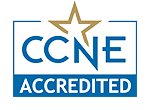
Bachelor of Science in Nursing (RN-BSN)
Online or In-Person
Flexible options
Finish in 3.5 years
Average completion time
Year-round enrollment
Our admissions team reviews applications year-round

Take the first step in your National University Journey

Program Overview
Degree:
Bachelor of Science in Nursing (RN-BSN) Degree
Application:
$0 application fee. No essays/exams.
Increase your knowledge of nursing and expand your career options with our RN to BSN (Registered Nurse to Bachelor of Science in Nursing) program. Candidates who hold an active and unencumbered RN license are eligible for the RN to BSN program. Nurses who earn a BSN are also able to pursue other nursing career paths, including advanced education, administration, and teaching, that are not available to nurses without a bachelor’s degree.
The RN to BSN program offers four- and eight-week courses 100% online. You’ll gain a foundation for professional nursing practice at the baccalaureate level to expand your clinical knowledge and further develop your critical-thinking, communication, and therapeutic skills.
National University’s RN-BSN program is now offered completely online! The program is available to students across the United States.*
*There are select states that are not available for this program. For eligibility by state, please contact the Admissions team for more details.
Degree Requirements
To receive a Bachelor of Science in Nursing (BSN), students must complete 180 quarter units as articulated in the general catalog, 45 quarter units must be completed at National University, 76.5 quarter units must be completed at the upper-division level and the program must fulfill a minimum 69 quarter units of the University General Education requirements. In absence of transfer credit, students may need to take additional general electives to satisfy the total units for the degree. Remedial courses accepted for the ASN degree may not transfer. Students should refer to the section on undergraduate admission procedures for specific information on admission and evaluation.
National University awards credit in quarter units, with each academic year divided into four 12-week quarters.
Each quarter is made up of three 4-week classes, with one class per month. Under the current policy, 4.5 units of credit are awarded for courses.
A maximum of 45 quarter units (30 semester units) of lower division credit may be allowed for clinical courses for a registered nurse who is a graduate of a three-year hospital nursing school. Up to 22.5 quarter units (15 semester units) of additional lower division credit may be granted for academically equivalent coursework. Students should refer to the section on undergraduate admission procedures for specific information on admission and evaluation. A maximum of 31.5 quarter units may apply toward the baccalaureate nursing (RN to BSN) degree if a student has passed the NCLEX-RN examination.
Preparation for Major
1 Course
Cultural Diversity
4.5 Quarter Units
Prerequisite: ENG 102
Examines race, gender, ethnicity and class in 20th century American society. Introduces students to methods for studying the changing nature of our society and explores ways in which our increasingly urbanized and technological culture affects all aspects of professional and unskilled work. May involve work in oral history.
Nursing Core Courses
10 Courses
Health Informatics
4.5 Quarter Units
Innovative and best practice technology applications to support human health by individuals, professionals, care delivery organizations, and communities. Internet-based health resources, smart phone/mHealth applications, telehealth, and health-related social networks. Systems, standards, and policies to connect people and technologies securely across healthcare ecosystems.
Professional Issues for RNs
4.5 Quarter Units
Addresses professional values, ethics, diversity and their associated behaviors foundational to the practice of nursing. Provides the student with tools to begin thoughtful discussion and problem solving within the social context of health care delivery and the practice environment of nursing. This course covers the Quality and Safety in Nursing Education (QSEN) competencies and the Institute of Medicine’s framework, legal issues and policies, ethics and finance.
Intro to Biomedical Statistics
4.5 Quarter Units
An introduction to concepts, procedures and software used in the statistical analysis of data in the health professions.
Evidence Based Practice
4.5 Quarter Units
Explores evidence-based practice as a foundation for improved nursing practice and healthcare outcomes. Emphasizes the application of research theory to evidence-based practice, including ethics in research and application of the research process.
NSG Leadership and Management
4.5 Quarter Units
Corequisite: NSG 442A
This 8 week course provides for the study of leadership and management principles as they apply to the delivery of quality health care and professional nursing practice. Models and concepts will be identified and explored as the nurse learns the importance of leading within the climate of a changing healthcare environment.
NSG LDRSHP & MGMT Practicum
3.00 Quarter Units
Corequisite: NSG 442
This 8 week practicum course focuses on organizational and systems leadership, quality improvement, and safety within a variety of health care settings. Emphasis is on the development of imaginative, innovative and creative strategies to promote a systems change. Grading is S/U only.
Community Population NSG
6.0 Quarter Units
Corequisite: NSG 444A
This 8 week course focuses on the analysis of the community nursing role and practice in examining the health status of a selected population to determine community oriented care. Addresses public health ethics, nursing advocacy and healthcare disparities. Topics include the importance of health promotion and the preservation of health across the lifespan, vulnerable populations, and global health considerations. Completion of community health courses can lead to the Public Health Nursing Certification in California.
Comm Pop NSG Practicum
3.0 Quarter Units
Corequisite: NSG 444
This 8 week practicum course provides students with the opportunity to use data to target community interventions, define strategies and access the determinants and distribution of health. Emphasis is on the epidemiologic and ecological principles that affect the health of vulnerable populations. Grading is S/U only.
Qual Improvement
4.5 Quarter Units
Corequisite: NSG 447A
This course introduces the concepts, techniques, strategies and metrics of quality improvement using the Quality and Safety Education for Nurses (QSEN) framework. Patient care quality and safety in the context of structure, process and outcomes in care delivery are explored. Identification of improvement opportunities, action plan development and outcomes evaluation through project management are addressed.
Qual Improvement Practicum
4.5 Quarter Units
Corequisite: NSG 447
During this 8 week course students conduct a quality improvement project under the supervision of a mentor or preceptor and the course instructor. Grading is S/U only.
Upper-Division Electives
7 Courses
In the absence of upper-division transfer units, additional quarter units of upper-division coursework may be needed to meet the minimum upper-division requirement of 76.5 quarter units. Electives should be chosen in consultation with the faculty and/or admission advisor.
Students should choose from the following Upper Division Electives
Health Education & Promotion
4.5 Quarter Units
Focuses on health education, health promotion and clinical preventive services. Strategies for counseling and education, health education theories and practices, and development of learner-centered instructional strategies will be explored. The cost-effectiveness of clinical preventive services will be discussed.
Issues & Trends in Healthcare
4.5 Quarter Units
A history of the U.S. health care delivery system will be explored to understand the current issues and trends. The changing roles of the components of the system as well as technical, economic, political, and social forces effecting change will be discussed. Inpatient, outpatient, and long term care will be explored.
Legal/Ethical Issues & Health
4.5 Quarter Units
Focuses on legal and ethical concepts, principles of ethics and law and use in resolving ethical conflicts and dilemmas in health care. Scope of practice, informed consent, employee and patient rights and responsibilities, patient abuse, and the influence of finance and corporate culture will be explored. Sample cases will be analyzed.
Spanish for the Work Place
4.5 Quarter Units
This course provides English-speaking students the necessary tools for communication with Spanish speakers in the work place.
Cross-Cultural Communication
4.5 Quarter Units
An examination of the basic cultural differences generally encountered in the workplace. Special emphasis is given to cross-cultural communication in the workplace.
Ethics
4.5 Quarter Units
Prerequisite: ENG 102
An examination of theories of value and ideological differences in practical applications to clarify ethical differences. Course emphasizes the dilemmas of personal and professional responsibility, including business and workplace circumstances, social relationships, and political practice.
Healthy Aging
4.5 Quarter Units
Focuses on the historical and cross-cultural, physiological, psychological, sociological, economic and political aspects of aging. Retirement patterns, living environments, chronic disease and the role of health care professionals will be explored.
Career Outlook
Data Source: The career outcomes data presented is sourced from Lightcast, which provides insights based on real-time job postings, public datasets, and analytics. Lightcast derives its data from sources such as the Bureau of Labor Statistics (BLS), the Quarterly Census of Employment and Wages (QCEW), and the Occupational Employment Statistics (OES). While accurate and reliable, this data reflects general labor market trends and may not represent individual outcomes or specific local conditions. For more details on Lightcast’s methodology, visit their Data Overview.
Here are some careers this degree could prepare you for:
Please select the state you will work in to view job data in your area
- Top Jobs in this field
- Median Salary
- Job Openings
- Registered Nurses
-
$93,353
avg. salary (USA) -
243,307
job openings (past yr.) past year
ALl of USAMost Desired Skills
- Nursing
- Nursing Care
- Medication Administration
- Nursing Process
- Home Health Care
- Medical Records
- Nursing Practices
ALl of USATop Companies Hiring
- HCA Healthcare
- Sanford Health
- Hartford HealthCare
- Fresenius
- Albany Medical Center
- Ascension
- CHRISTUS Health
Program Learning Outcomes
Learn the key skills to help you excel in your field of study.
- Develop caring, therapeutic nursing relationships with individuals, families, groups, and populations.
- Provide safe, high-quality, culturally competent, patient-centered nursing care for individuals across the lifespan in a variety of settings.
- Participate in the continuous improvement of nursing care, quality, and safety.
- Use nursing judgment to manage, prioritize, and delegate patient care in a variety of healthcare settings.
- Effectively communicate and collaborate with patients and the interdisciplinary team.
- Demonstrate professional identity by incorporating established standards of practice within the legal and ethical framework of nursing.
- Apply best, current evidence into nursing practice to achieve desired outcomes.
Program Highlights
- Students who pass the NCLEX-RN exam receive 31.5 upper division quarter unit credits
- 100% online program
- Degree can be completed in as little as 11 months
- Four- and eight-week classes
- Focus on one subject per month while maintaining full-time status
- Start the program any month during the year
- Eligible Transfer to Success Scholarship applicants receive up to $4,800
- Earn a California Public Health Nurse Certificate
- No prerequisite courses required
- Hands-on experience working with leaders and community partners

Admissions
Transfer Students Welcome
Enrolling in a university is a big decision. That’s why our dedicated admissions team is here to guide you through the admissions process and help you find the right program for you and your career goals.
To that end, we’ve simplified and streamlined our application process, so you can get enrolled in your program right away. Because we accept and review applications year round, you can begin class as soon as next month, depending on your program and location of choice.
Learn more about undergraduate, graduate, military, and international student admissions, plus admissions information for transfer students. You can also learn more about our tuition rates and financial aid opportunities.
To speak with our admissions team, call (855) 355-6288 or request information and an advisor will contact you shortly. If you’re ready to apply, simply start your application today.

Pricing
The cost shown is the estimated price for this degree. Many National University students are eligible for scholarships or financial aid, which may substantially lower a degree program’s cost.
You can visit our Tuition Estimator to see what scholarships and discounts are available and get more information about expected costs. You can also start the application process and receive counseling from our Enrollment team on the costs of your degree
Scholarships and Financial Aid
National University is dedicated to making higher education affordable, as well as accessible. Through NU scholarship offerings, eligible students are able to reduce the financial burden of college, start classes sooner, and finish their programs faster while focusing on achieving their goals.
Accreditations

The Bachelor of Science in Nursing – RN to BSN program at National University is accredited by the Commission on Collegiate Nursing Education (http://www.ccneaccreditation.org).

The Bachelor of Science in Nursing – RN to BSN program at National University is approved by the California Board of Registered Nursing (BRN).

The Western Association of Schools and Colleges (WASC) accredits public and private schools, colleges, and universities in the U.S.

Why National University?
We’re proud to be a Veteran-founded, San Diego-based nonprofit. Since 1971, our mission has been to provide accessible, achievable higher education to adult learners.
Today, we educate students from across the U.S. and around the globe, with over 245,000 alumni worldwide.

“National University has impacted my career. You can immediately apply what you learn in class to your business.”
Francisco R.,
Class of 2016
What makes a degree
with National University unique?
Free Tutoring Sessions
Access personalized tutoring sessions at no cost — empowering your learning.
Online and In-Person
Flexibility meets quality education with our online and in-person learning options.
24/7 Support
Get assistance anytime, anywhere with our round-the-clock support services.
Military Friendly
Committed to serving those who serve — diverse resources and support for veterans and family. Military and Veteran Admissions.
Mentoring Network
Individual student and alumni career guidance, professional development opportunities, and customized career support.
Transfer Students Welcome
NU makes it easy to get your degree, even if you started it with another university. Learn more about transferring to NU.
Accelerate Your Career With NU
At National University, you’re part of a family. As a student, you’ll have the support of staff, faculty members, students, and alumni who will be there with you every step of the way, cheering you on as you pursue your goals.
Our network of 245,000 alumni is a large global community that provides our graduates with the professional connections to get a leg up in your new career.

Additional Resources
Program Disclosure
Successful completion and attainment of National University degrees do not lead to automatic or immediate licensure, employment, or certification in any state/country. The University cannot guarantee that any professional organization or business will accept a graduate’s application to sit for any certification, licensure, or related exam for the purpose of professional certification.
Program availability varies by state. Many disciplines, professions, and jobs require disclosure of an individual’s criminal history, and a variety of states require background checks to apply to, or be eligible for, certain certificates, registrations, and licenses. Existence of a criminal history may also subject an individual to denial of an initial application for a certificate, registration, or license and/or result in the revocation or suspension of an existing certificate, registration, or license. Requirements can vary by state, occupation, and/or licensing authority.
NU graduates will be subject to additional requirements on a program, certification/licensure, employment, and state-by-state basis that can include one or more of the following items: internships, practicum experience, additional coursework, exams, tests, drug testing, earning an additional degree, and/or other training/education requirements.
All prospective students are advised to review employment, certification, and/or licensure requirements in their state, and to contact the certification/licensing body of the state and/or country where they intend to obtain certification/licensure to verify that these courses/programs qualify in that state/country, prior to enrolling. Prospective students are also advised to regularly review the state’s/country’s policies and procedures relating to certification/licensure, as those policies are subject to change.
National University degrees do not guarantee employment or salary of any kind. Prospective students are strongly encouraged to review desired job positions to review degrees, education, and/or training required to apply for desired positions. Prospective students should monitor these positions as requirements, salary, and other relevant factors can change over time.
Back to top